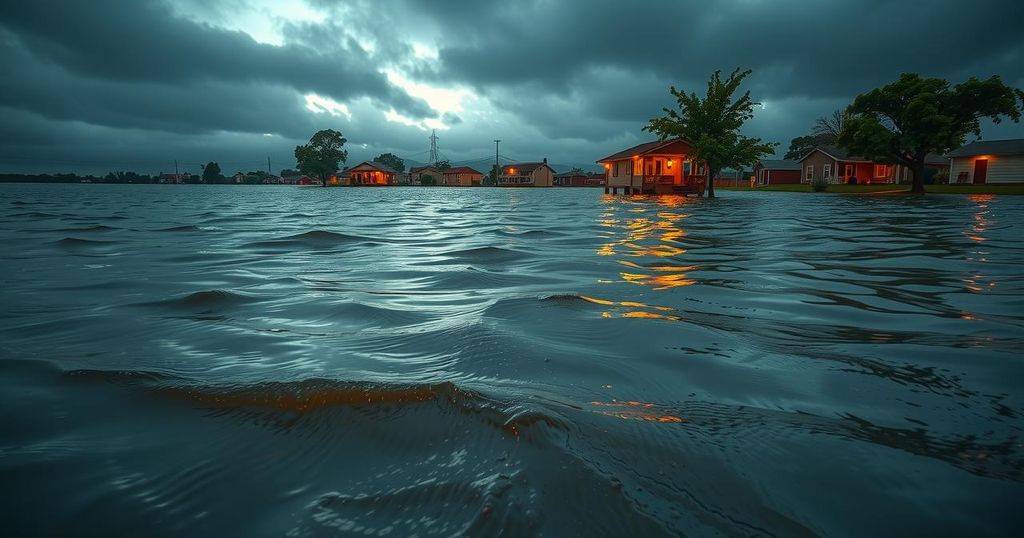Scientists warn that global warming is worsening flooding across Africa, with seasonal rainfall intensifying by 5-20 percent, leading to severe humanitarian crises in several countries. Research indicates that human-driven climate change is a primary factor contributing to these extreme weather conditions, impacting the continent significantly despite its minimal contribution to global emissions. Experts call for urgent action to transition from fossil fuels to mitigate future risks.
Climate change is increasingly exacerbating flooding in Africa, particularly as it experiences a significant rise in extreme weather events despite contributing minimally to global greenhouse gas emissions. According to scientists, global warming has intensified the rainy season across numerous African countries in 2024, leading to deadly floods affecting areas such as the Niger and Lake Chad basins. The World Weather Attribution (WWA) network reported that climate change, primarily driven by fossil fuel consumption, has aggravated seasonal rainfall by 5 to 20 percent this year, triggering a severe humanitarian crisis. The researcher Izidine Pinto from the Royal Netherlands Meteorological Institute expressed concerns over the alarming findings, highlighting that heavy summer rainfall has now become a common occurrence in countries like Sudan, Nigeria, Niger, Cameroon, and Chad. He cautioned that with each incremental rise in temperature, the likelihood of extreme flooding incidents will continue to increase. Pinto urged for acceleration in the shift away from fossil fuels, particularly during the upcoming United Nations COP29 climate summit in Azerbaijan. The floods in West and Central Africa are reported to have claimed approximately 1,500 lives and displaced over one million individuals, as noted by the United Nations Office for the Coordination of Humanitarian Affairs (OCHA). The torrential rains have overwhelmed infrastructure such as dams, notably in Nigeria and Sudan. Furthermore, the WWA network warned that such detrimental weather patterns could potentially recur annually if global temperatures rise by 2 degrees Celsius (3.6 degrees Fahrenheit) relative to pre-industrial levels, with forecasts suggesting this scenario could materialize as early as the 2050s. The scientific focus included war-impacted regions like Sudan, which have witnessed a significant influx of displaced populations in flood-prone areas. Researchers employed modeling techniques to evaluate current climatic conditions against a hypothetical scenario devoid of human-induced warming, establishing that prolonged periods of intense rainfall in Sudan have become more severe due to climate change conditions. It is noteworthy that while Africa has minimally contributed to global carbon emissions, it nonetheless experiences the most severe impacts of extreme weather. Joyce Kimutai from the Centre for Environmental Policy at Imperial College London stated the critical nature of this disparity. Additionally, scientists emphasized that the consequences of flooding and climate change are further complicated by factors such as inadequate dam maintenance and the necessity for investment in early warning systems. Clair Barnes from the same center reiterated the urgency of addressing these challenges, stating, “This is only going to keep getting worse if we keep burning fossil fuels.”
The article addresses the severe impact of global warming on rainfall patterns leading to catastrophic flooding in Africa, a region that, despite its minimal contribution to global emissions, is facing dire consequences of climate change. The scientists delve into the correlation between human-induced climate change and the increasing intensity and frequency of floods, citing specific countries affected and projecting future risks of extreme weather. The article also encompasses expert opinions urging for a transition from fossil fuels to mitigate further climatic disruptions, set against the backdrop of global discussions on climate action during major summits such as COP29.
In summary, the intensified flooding in Africa, exacerbated by global warming, underscores a troubling paradox where the continent bears the brunt of climate change effects while contributing the least to its causes. Experts advocate for urgent climate actions, emphasizing the need for sustainable infrastructure improvements and significant reductions in fossil fuel reliance to prevent further humanitarian crises. These findings spotlight the critical dual responsibility of addressing both climate change and local infrastructure inadequacies to protect vulnerable populations.
Original Source: www.aljazeera.com






